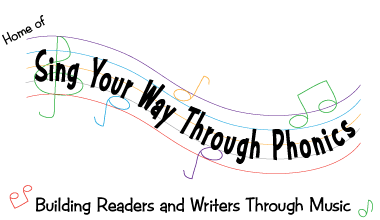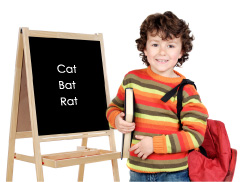Action Factor, Inc. presents the workshop for teachers and parents…

Sound Off!
Building Phonemic Awareness Through Rhythm and Rhyme
Presenter: Dr. Myrna R. Gifford
Workshop overview: Phonemic awareness and phonological awareness are important components of students’ preparation for reading and writing. This workshop familiarizes early childhood educators with practices that help students develop sensitivities to the sounds and symbols of their language. Through play, singing, chanting, and moving, young students can be helped to build foundations for literacy and learning. These early literacy activities promote a fascination with language because they are aligned with students’ natural inclinations, abilities, and interests. Workshop participants will construct ready-to-use learning aids that can be expanded and modified to suit the individual needs of their preschoolers.
Objectives of the presentation: Participants will become familiar with:
- the nature and importance of phonemic/phonological awareness in students from birth to age 8.
- activities that promote discrimination of phonemes (language sounds).
- activities that promote discrimination of graphemes (printed forms).
- activities that promote linking the sounds of language with their written representations.
Format of the presentation: This is an interactive multi-media make-and-take workshop with audience participation. Participants construct materials that can be used in the classroom. Construction projects include games, sing-along books, and manipulatives. Some projects are suitable for learning centers. (Cost of construction materials is not included in workshop pricing.)
Target age group: Birth to 8 years
The target audience: Preschool and student care providers, early childhood teachers, special educators, and administrators interested in improving the quality and effectiveness of their programs in developing early literacy foundations.
Brief summary of content: Parents and educators can lay the foundations that support oral and written language development. In the earliest stages, students can be sensitized to environmental sounds. As students refine the ability to identify and discriminate the sounds around them, adults can help them transfer this skill to language sounds. One of the first language units that students discriminate are syllables, followed by rhyme and alliteration. Through nursery rhymes, songs, and other word plays, students build the knowledge needed for phonemic awareness—segmenting and blending the sounds in words. Next, students link the sounds in words to their written representation—the letters of the alphabet. From there, it is a short step to blending letters into words and recognizing print. Word families and spelling patterns can be learned through songs, games, and manipulatives in a manner so pleasant, students hardly realize they are learning!
To request a customized workshop at your location, please use our online form.


